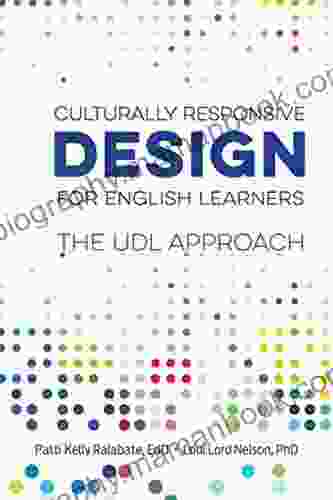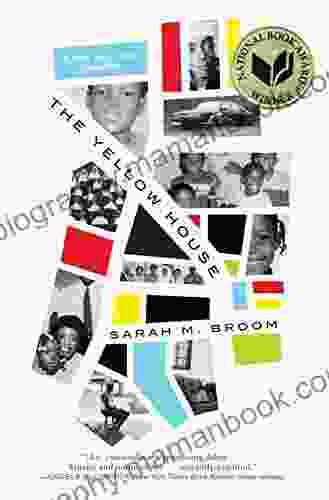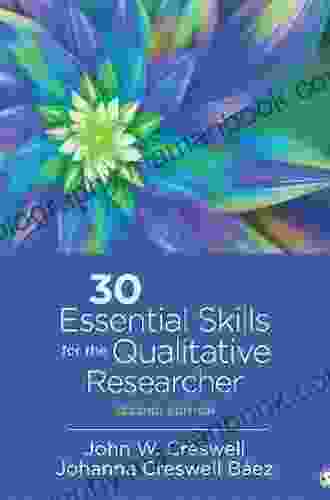30 Essential Skills for the Qualitative Researcher: A Comprehensive Guide to Mastering the Art of Qualitative Inquiry

Qualitative research is a powerful methodology that allows researchers to gain a deep understanding of complex phenomena. Qualitative researchers use a variety of methods to collect and analyze data, including interviews, focus groups, observation, and document analysis. To be successful in qualitative research, researchers need to possess a range of essential skills.
4.9 out of 5
| Language | : | English |
| File size | : | 37028 KB |
| Text-to-Speech | : | Enabled |
| Screen Reader | : | Supported |
| Enhanced typesetting | : | Enabled |
| Word Wise | : | Enabled |
| Print length | : | 336 pages |
This article provides a comprehensive guide to the 30 most important skills for qualitative researchers. These skills are divided into four categories: data collection, data analysis, writing and presenting, and research ethics.
Data Collection Skills
- Interviewing: The ability to conduct effective interviews is essential for qualitative researchers. Researchers need to be able to establish rapport with participants, ask open-ended questions, and probe for deeper insights.
- Focus groups: Focus groups are another important data collection method for qualitative researchers. Researchers need to be able to design and facilitate focus groups that are productive and insightful.
- Observation: Observation is a valuable tool for qualitative researchers who want to gain a deep understanding of the social world. Researchers need to be able to observe people and their interactions in a systematic and unobtrusive way.
- Document analysis: Document analysis is a method of data collection that involves examining written documents, such as transcripts, emails, and articles. Researchers need to be able to identify the key themes and patterns in documents.
Data Analysis Skills
- Coding: Coding is a process of categorizing data into themes and patterns. Researchers need to be able to develop a coding scheme that is both reliable and valid.
- Thematic analysis: Thematic analysis is a method of data analysis that involves identifying and interpreting the key themes that emerge from the data.
- Narrative analysis: Narrative analysis is a method of data analysis that focuses on the stories that participants tell. Researchers need to be able to identify and interpret the key narratives in the data.
- Grounded theory: Grounded theory is a method of data analysis that involves developing a theory from the data itself. Researchers need to be able to use the data to generate hypotheses and build a theoretical framework.
- Computer-assisted qualitative data analysis software (CAQDAS): CAQDAS software can be a valuable tool for qualitative researchers. Researchers can use CAQDAS software to manage, code, and analyze large datasets.
Writing and Presenting Skills
- Writing: Qualitative researchers need to be able to write clearly and effectively. They need to be able to write research reports, journal articles, and other academic documents.
- Presenting: Qualitative researchers need to be able to present their findings in a clear and engaging way. They need to be able to use both oral and written presentation skills.
- Visualizing data: Visualizing data can be a powerful way to communicate research findings. Researchers need to be able to create clear and effective visualizations.
- Communicating with non-academic audiences: Qualitative researchers need to be able to communicate their findings to a variety of audiences, including non-academic audiences. They need to be able to tailor their communication style to the needs of their audience.
Research Ethics Skills
- Informed consent: Researchers need to be able to obtain informed consent from participants before they participate in a research study. Researchers need to explain the purpose of the study, the procedures that will be used, and the potential risks and benefits of participation.
- Confidentiality: Researchers need to protect the confidentiality of participants. They need to make sure that participants' identities are kept confidential and that their data is stored securely.
- Objectivity: Researchers need to be objective in their research. They need to avoid bias and present their findings in a fair and unbiased way.
- Reflexivity: Researchers need to be reflexive about their own role in the research process. They need to be aware of how their own biases and experiences may affect their research.
- Ethics review: Researchers need to submit their research proposals to an ethics review board for approval before they can begin their research. Ethics review boards help to ensure that research is conducted in an ethical manner.
The 30 skills listed above are essential for qualitative researchers. Researchers who possess these skills will be well-equipped to conduct high-quality qualitative research studies. They will be able to collect, analyze, and write about their findings in a clear and effective way. They will also be able to communicate their findings to a variety of audiences, including non-academic audiences.
If you are interested in a career in qualitative research, it is important to develop these skills. You can do this by taking courses, attending workshops, and reading academic literature. You can also gain experience by volunteering or working on research projects.
With the right skills and experience, you can become a successful qualitative researcher. You can use your skills to make a difference in the world by gaining a deep understanding of complex phenomena and communicating your findings to others.
4.9 out of 5
| Language | : | English |
| File size | : | 37028 KB |
| Text-to-Speech | : | Enabled |
| Screen Reader | : | Supported |
| Enhanced typesetting | : | Enabled |
| Word Wise | : | Enabled |
| Print length | : | 336 pages |
Do you want to contribute by writing guest posts on this blog?
Please contact us and send us a resume of previous articles that you have written.
 Top Book
Top Book Novel
Novel Fiction
Fiction Nonfiction
Nonfiction Literature
Literature Paperback
Paperback Hardcover
Hardcover E-book
E-book Audiobook
Audiobook Bestseller
Bestseller Classic
Classic Mystery
Mystery Thriller
Thriller Romance
Romance Fantasy
Fantasy Science Fiction
Science Fiction Biography
Biography Memoir
Memoir Autobiography
Autobiography Poetry
Poetry Drama
Drama Historical Fiction
Historical Fiction Self-help
Self-help Young Adult
Young Adult Childrens Books
Childrens Books Graphic Novel
Graphic Novel Anthology
Anthology Series
Series Encyclopedia
Encyclopedia Reference
Reference Guidebook
Guidebook Textbook
Textbook Workbook
Workbook Journal
Journal Diary
Diary Manuscript
Manuscript Folio
Folio Pulp Fiction
Pulp Fiction Short Stories
Short Stories Fairy Tales
Fairy Tales Fables
Fables Mythology
Mythology Philosophy
Philosophy Religion
Religion Spirituality
Spirituality Essays
Essays Critique
Critique Commentary
Commentary Glossary
Glossary Bibliography
Bibliography Index
Index Table of Contents
Table of Contents Preface
Preface Introduction
Introduction Foreword
Foreword Afterword
Afterword Appendices
Appendices Annotations
Annotations Footnotes
Footnotes Epilogue
Epilogue Prologue
Prologue Moira Linehan
Moira Linehan Doug Goodkin
Doug Goodkin Orlando Ricardo Menes
Orlando Ricardo Menes J Donald Walters
J Donald Walters Klaus Larres
Klaus Larres Hilari T Cohen
Hilari T Cohen Jake Schafft
Jake Schafft Darryl Cheng
Darryl Cheng Lisa M Jones
Lisa M Jones Naomi Lucas
Naomi Lucas John Quincy Adams
John Quincy Adams Assia Djebar
Assia Djebar Jacqueline Ruiz
Jacqueline Ruiz Kathy Hearn
Kathy Hearn Debbie Happy Cohen
Debbie Happy Cohen Michael H Shuman
Michael H Shuman Shifio S Patterns
Shifio S Patterns Rob Winters
Rob Winters Jodi Taylor
Jodi Taylor Kim Michele Richardson
Kim Michele Richardson
Light bulbAdvertise smarter! Our strategic ad space ensures maximum exposure. Reserve your spot today!

 Deacon BellUnlocking Language Barriers: A Comprehensive Guide to Culturally Responsive...
Deacon BellUnlocking Language Barriers: A Comprehensive Guide to Culturally Responsive...
 Maurice ParkerThe Defiant Life of Andrew Jackson: A Tale of Military Genius, Political...
Maurice ParkerThe Defiant Life of Andrew Jackson: A Tale of Military Genius, Political... John MiltonFollow ·15.8k
John MiltonFollow ·15.8k Ed CooperFollow ·2k
Ed CooperFollow ·2k Emilio CoxFollow ·4.6k
Emilio CoxFollow ·4.6k Brett SimmonsFollow ·5.7k
Brett SimmonsFollow ·5.7k Ira CoxFollow ·10.5k
Ira CoxFollow ·10.5k Gregory WoodsFollow ·10.7k
Gregory WoodsFollow ·10.7k Colin FosterFollow ·2k
Colin FosterFollow ·2k Tony CarterFollow ·7.8k
Tony CarterFollow ·7.8k

 Barry Bryant
Barry BryantKnitting Pattern Kp190 Baby Sleeping Bags Sizes 3mths...
This easy-to-follow...

 Rudyard Kipling
Rudyard KiplingFolk Music Arrangements of Bartók: A Musical Tapestry of...
Béla Bartók, the renowned...

 Garrett Bell
Garrett BellThe Yellow House Memoir: A Literary Masterpiece that...
A Journey of Resilience,...

 George Martin
George MartinAssassin Witch Dark Faerie: The Bonegates
In the shadowy...
4.9 out of 5
| Language | : | English |
| File size | : | 37028 KB |
| Text-to-Speech | : | Enabled |
| Screen Reader | : | Supported |
| Enhanced typesetting | : | Enabled |
| Word Wise | : | Enabled |
| Print length | : | 336 pages |












